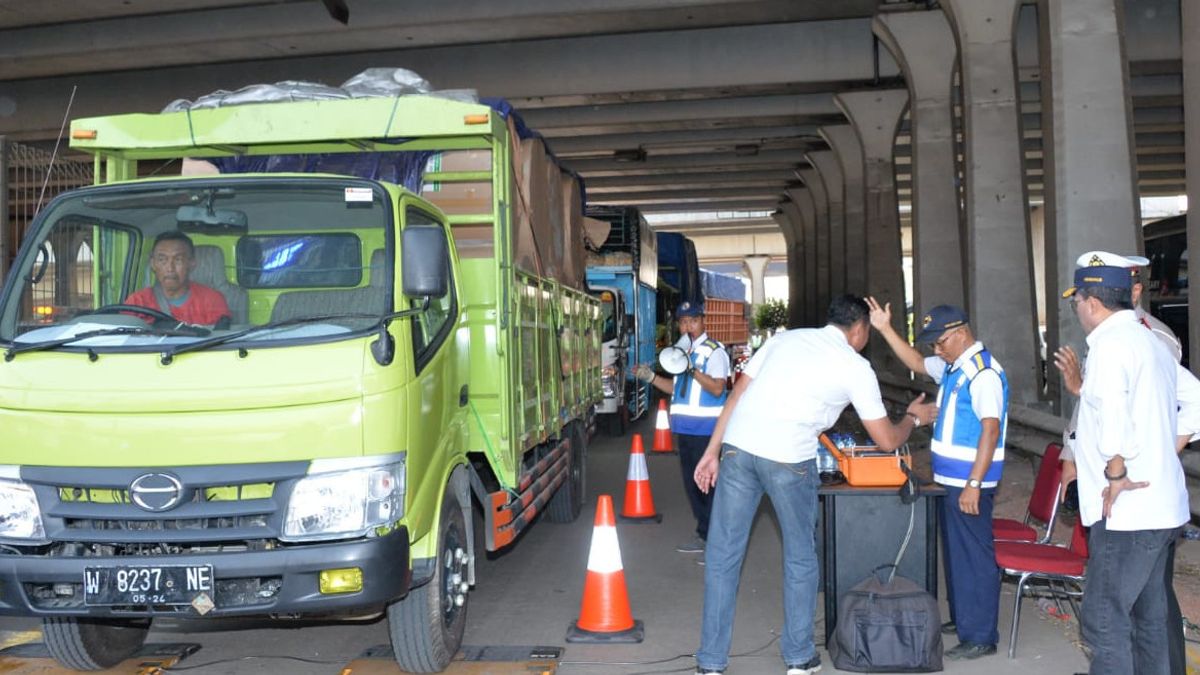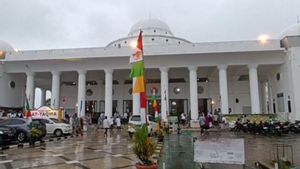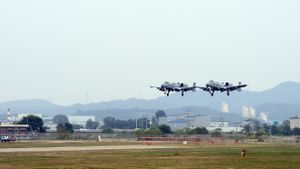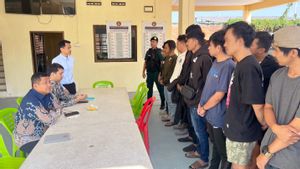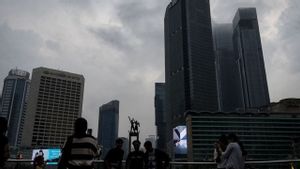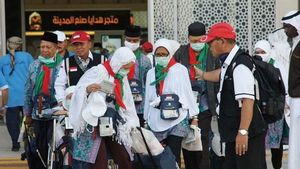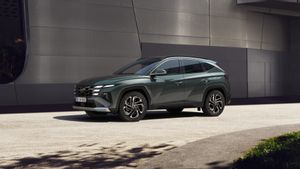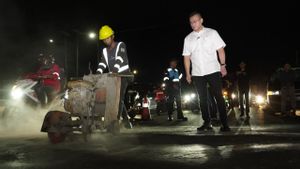JAKARTA - A number of unscrupulous goods owners and goods transportation entrepreneurs are considered to be taking advantage of the corona virus or COVID-19 pandemic situation in Indonesia for personal gain. They transport goods over dimension and overload (ODOL), with vehicles not complying with factory production standards.
Transportation Observer of Soegijapranata Catholic University (Unika) Djoko Setijowarno said that the unskilled actions of this person in the end can cause more road damage and are prone to traffic accidents.
"It has been proven that there have been successive traffic accidents on the Tegal-Purwokerto route, to be precise, Pagojengan Village, Paguyangan District, Brebes Regency, Tuesday, March 31," he said, through a written statement received by VOI, in Jakarta, Wednesday, April 8.
Djoko said, a similar thing also happened at Kartasura Market in early April. A truck loaded with paper hit a pedestrian bridge (JPO) and caused the bridge to collapse.
As a result, residents' activities were disrupted. This is because local residents can no longer use the JPO to cross the road. Even though the daily vehicle traffic on the road is quite dense, making it difficult to cross without a JPO.
Even though Djoko said, the government has issued Regulation of the Minister of Health of the Republic of Indonesia Number 9 of 2020 concerning Guidelines for Large-Scale Social Restrictions (PSBB) in the Context of Accelerating Handling of Corona Virus Disease 2019 (COVID-19).
Article 13 Permenkes No. 9/2020 regulates the implementation of the PSBB, which among other things includes restrictions on transportation modes. Restrictions on transportation modes are exempted for passenger transportation modes, both public and private, by taking into account the number of passengers and maintaining the distance between passengers.
However, said Djoko, the restriction did not apply to the traffic of logistics vehicles or goods. Because people really need food and medicine.
"The current condition should not be used by entrepreneurs who own goods to seek maximum personal gain at the expense of other parties," he said.
Add Rule
Djoko suggested that the government should be able to add rules in the implementation of the PSBB, namely not allowing over dimension over loading (ODOL) goods transportation during the PSBB and will take action against goods vehicles that are ODOL in accordance with the applicable regulations. This is because the resulting impact can erode state finances.
"The state must repair roads that are quickly damaged. Meanwhile, the government is busy setting aside the state budget to deal with the economic impact of the COVID-19 pandemic," he explained.
During the COVID-19 outbreak season, a number of Motor Vehicle Weighing Organizing Units (UPPKB) will be temporarily closed. A number of UPPKB and Police employees who used to work at the UPPKB were assigned to a number of Type A Terminals to help monitor public bus passengers in preventing the spread of the corona virus.
In the midst of reduced mobility of private vehicles, said Djoko, goods vehicles still cross the road. A different scene occurred on the toll road after the closure of a number of UPPKBs on national roads, the population of ODOL truck mobility increased. It could be that the level of road damage during the COVID-19 pandemic is higher than usual days.
Djoko said that the ban on ODOL vehicles at ferry ports has been implemented, at least it can curb ODOL vehicles passing from Java and Sumatra. However, not all, only some ports from Java to Kalimantan and Sulawesi.
"However, the problem is that it will be stuck at the ferry port, if goods transport vehicles cross at almost the same time (rush hour)," he said.
According to Djoko, the ODOL restriction would indeed be very prone to conflicts in the field, if arrangements had not been anticipated for ODOL vehicles from the port.
In addition, said Djoko, it is necessary to anticipate the bad habits of drivers who do not accept and are compact and will make the situation on the ground less conducive by parking vehicles carelessly.
"But what is clear is that together with the police and the TNI we must not lose to individual truck drivers and indeed an adequate parking lot and turn-around area for ODOL trucks must be prepared, so as not to interfere with the smooth and comfortable crossing services," he said.
According to Djoko, don't let ODOL goods vehicles pass by on the road without supervision and control. Despite the COVID-19 pandemic, the rules for limiting ODOL goods vehicles still apply.
"Stop the action of the ODOL cargo vehicle in any condition," he said.
Moreover, he said, Director of Infrastructure Ditjenhubdat Risal Wasal said there were five ODOL problems in the field. First, the socialization is still not optimal at the port. Second, direct toll access without passing UPPKB.
Then, third, not all UPPKBs have applied cargo transfer sanctions or are prohibited from continuing their journey. Fourth, Law Enforcement (Gakkum) article 277 has not been fully implemented by Civil Servant Investigators (PPNS), both central and regional. Fifth, law enforcement on toll roads has not been optimally implemented.
The English, Chinese, Japanese, Arabic, and French versions are automatically generated by the AI. So there may still be inaccuracies in translating, please always see Indonesian as our main language. (system supported by DigitalSiber.id)
